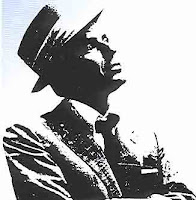Just a month remains before I make that drive up Highway 99 to Lodi. It's a small step, the required first step in a journey of thousands of miles.
I've never planned anything as extensively. The process has been interesting, exciting and rewarding. I'm nost pleased by the fact that I got to work with my son, Jesse. We make a good team and our very different skills sets and personalities complement each other (in my not so humble opinion).
Here's a piece I wrote not long ago about planning:
GO CAT GO
One for the money
Two for the show
Three to get ready
And four to goElvis and his blue suede shoes notwithstanding, these lines, believed to come from children's literature, resonated in my family’s lexicon during the '50s -- even before Sam Perkins and the King made them famous as lyrics for one of the first Rock and Roll classics.
Our version wasn't embellished with gyrating pelvises or catchy taglines like "go cat go!" But the little jingle did generate a sense of excitement as it signaled adventure; it preceded and was part of the build-up toward amily outings.
We lived in Ohio back then, a family of five with the kids ranging in age from 3 or 4 to about 10.
Times were a bit tough as our father was undergoing a career change, attending classes during the day and working nights at an airplane factory.
He also provided bus service for pre-schoolers on weekdays, transporting youngsters to and from a small daycare operation that our mother ran out of our house.
This was the golden age of drive-in movies. The baby boom was in full swing and millions of families opted to create an environment-on-wheels that could contain and isolate young children from the rest of the movie-going audience.
Family comfort zones were created with blankets, pillows, ice chests, bags of home-made popcorn and other goodies and just about anything that might come in handy during a three-hour-or-longer double feature.
I must confess that there were a few drive-in movie adventures later in my life that featured a level of excitement that took me to places I never knew existed back in the '50s; but at the time, I don't think anything could top being crammed into that small space with the family, eating popcorn and staring through the windshield at that huge outdoor screen before falling asleep during the second feature.
I loved waking up later, either still at the drive-in, on the way home or as I was carried or led, half asleep, from the car to my bed at the end of the outing.
The drive-in experience was filled with fascinating opportunities for adventure -- visiting (but never making purchases at) the snack bar, trekking down to the playground located directly in front of the huge billboard-like projection screen, walking among rows of cars perched at an angle on earthen berms engineered to provide unobstructed views and peering into the little worlds others created inside their vehicles.
Reflecting on those happy days, I now realize that family outings were part of a series of lessons I took from childhood into my later life.
I learned about making the most of limited resources, about sharing and about cooperation. But the biggest lesson taken from family outings was about logistics -- about planning.
That little rhyme, repeated like a mantra, instilled two values in my being. First, I came to believe that thinking things through before taking action was a good thing; and I also learned that when one engages in planning, enjoyment increases.
In recent years, I've accused my mother several times of acting hastily -- of making major decisions without thinking things through. I've even been guilty of admonishing her for these snap decisions by charging that this is not the "Burke way."
Deliberation was a constant barrier to action when I was growing up. Decisions just weren't made quickly or without research and analysis.
Though I was often frustrated by the delay between "why don’t we…" and "lets do…" I took the lesson.
My first role model, Davy Crockett, reinforced this message -- that is, he did so as portrayed by Fess Parker in a television series that captured every fiber of my boyhood interest.
"Be sure you are right," began Crockett’s motto. "Then go ahead."
Planning and deliberation played a big role in our family, even for small decisions. We never went to the movies, for example, unless the main feature was rated "excellent" or at least "good" by Consumer Reports, a precursor to "Siskel and Ebert."
In fact, Consumer Reports was a guide to many material choices in our family. It was required reading as a companion to the Sears or Wards catalog and products that failed inspection by the Consumers' Union just didn’t make it into our household. The most prized purchases were not only top-rated, but were also labeled as "Best Buys."
My parents believed in rational planning, they believed in comprehensive, strategic and global planning. No decision was small or inconsequential enough to avoid scrutiny and few non-routine actions were taken without considering options and alternatives.
No, we weren't what you call "spontaneous."
The outcome of this admittedly obsessive devotion to considered decisions isn't completely negative. The second lesson, or value, I took away was that deliberation enhances anticipation.
Deliberation enhances anticipation. The Heinz catsup commercial makes my point. As we watch and wait for that otherwise ordinary condiment to finally make its way out of the bottle and onto our burger, we realize how much we really want it.
We "taste" that first bite in our imaginations a hundred times before that bright red sauce finally emerges and we consummate what has become an urgent need to become one with the burger.
In similar fashion, planning, deliberating, considering, preparing, discussing, mapping, budgeting, practicing, coordinating, organizing, packing, loading, making ready and beginning all become opportunities for increasing enjoyment.
In fact, the actual event -- whether a movie, a hamburger, a trip, a purchase or anything else -- may actually be a bust because of weather, bad luck, crowds, cancellations or other unforeseen eventualities.
But those of us who have already experienced -- and enjoyed -- the event dozens of times in our imaginations aren’t missing as much as others.
And when, as Hannibal Smith of the "A Team" said, "a plan comes together" and the event is a roaring success, those who've been anticipating it longest and strongest surely appreciate every nuance more deeply than the snap-judgment crowd.
These simple lessons of childhood served me well in my professional life as a recreation administrator.
I learned that most leisure activities present five unique opportunities for enjoyment. Planning is the first of these.
I believe that there is a direct correlation between the amount of time and energy spent planning and anticipating an event and the enjoyment ultimately derived from participating.
Those who rush from one activity to the next without planning probably get less from the experience than they could.
The second opportunity for enjoyment comes while traveling to an event or otherwise getting things ready. With a little extra planning, the car ride or the setup for an activity can build interest and excitement -- the closer one comes to the destination or start time, the more intense the anticipation.
The third -- and some might say most important -- phase, of course, is the activity itself. But this "action" phase is often of short duration.
The fourth phase is travel home or clean up. This presents the first opportunity to "debrief." By sharing reactions with others immediately after an event, we create legends and history -- such accounts become part of our culture and really define us.
I'm dismayed when, after an event or outing, people focus on negatives. By choosing that path, they lessen enjoyment.
Time has a way of painting over negatives and we tend to remember most events as having been quite positive. But making an effort to reinforce positives in the period immediately following an event can greatly enhance future pleasure.
That future pleasure is the final, never-ending phase of a great event and I will argue that remembering is far more powerful, for major events, than the events themselves.
Reflecting on joyful times can be one of the most rewarding activities in life. Reliving experiences that have added meaning to our lives is pleasurable.
By planning and focusing more energy on travel or set-up and clean-up, we can enhance experiences and create more powerful memories.
It's one for the money
Two for the show
Three to get ready
Four to go
Five to have a great time
Six to come home again, and
Seven to remember for the rest of our lives
Now, go, cat go!


